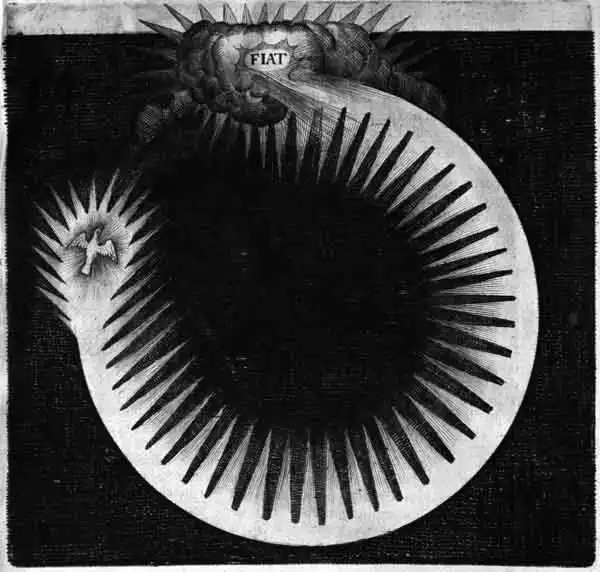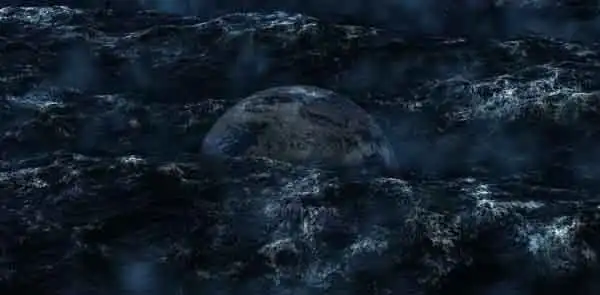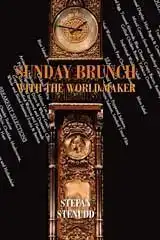Creation Myths
|
by Stefan Stenudd |
The rulership of that culture claims its right through the myth, its priesthood forms the rules of worship and celebration around it, and the members of that society define their roles and aspirations based on it.
Although a creation myth is rarely comparable to a law, the society that confesses to it tends to read it as the primary reason for the order to which it subjects its citizens. The creation myth is not their constitution, but proclaims the principles to which a constitution must conform, in order to work in the world as they know it.
Knowledge, too, is greatly influenced by the ideas presented in the creation myth. What can be known, and how it can be understood, are set out by it. The perspectives that are absent from the creation myth are unlikely to be explored by the culture loyal to it. The same is true for the line of reasoning fathomable within that culture, as well as the reach of its language, and the directions of its thoughts.
The ideas on how the world was formed shape the very patterns of any other ideas, and the paths that they will pursue. The creation of the world sets the rules for how the world can be perceived and explored. It forms the boundaries of what the world is, and what it is not.
Man, Too
A creation myth also proclaims the role of man in the world. The myth fixes his destiny and in what way he will find meaning in his existence.He may be the very goal of creation, or he may be just a lesser ingredient in it. Both cases are found in creation myths around the world. In several myths man is nothing but a persistent disturbance, annoying his maker.
This is of vast importance in how man relates to nature and the world around him. It is also instrumental in how he regards himself, his potential, his rights and obligations.
Indeed, the creation myth of a society sets the stage for all the thoughts nurtured by it. The myth also influences what perspectives are at all possible to conceive and comprehend. This is true for our modern world, too. For example, the Big Bang theory does not deviate greatly from the creation of the world by its divinely distant maker simply pronouncing: “Let there be!”

Fiat (Latin for "Let there be"), the word by which God creates. This is a symbolic depiciton of how God's spirit in the form of a dove creates light. Illustration from Utriusque Cosmi Historia, by Robert Fludd, 1617.
Human Thought Revealed
The above makes the creation myths extremely rewarding in examining the thoughts and thought patterns of any culture. In addition, it's usually the most spectacular and splendid example of imagery and imagination of its culture.When the mind ventures as far as to the very beginning of the world, it performs a feat that must be at the height of its capacity. So, what the mind manages to envision on that quest draws from the outmost borders of its reach. The creation myth is one of the greatest achievements of the human mind, in any given cultural situation. That may be one of the major reasons for such myths being praised so highly in the cultures of their emergence.
Since the creation myth can reveal so much about man’s thoughts, it's an excellent material for studying the nature of the human mind. It reveals essential things about the patterns of human thought: how physical experience leads to intellectual conclusions, how the mind makes up for missing pieces in the puzzle of understanding the world we live in, and how the mind relates to its own conclusions.
There is a lot about the human nature to be revealed through the creation myths – provided we learn to interpret them accurately.
Trusting Creation Myths
To comprehend creation myths we must try to understand the minds of the people who originally invented them. But many of those myths are so old that very little can be known for sure about their makers.Actually, several myths have such a distant origin that these same myths are the only clues to the thoughts of the cultures from which they sprang. So, we have to track their thoughts through the myths, in order to get any understanding of their minds, by which to get the meanings of the myths revealed.
Of course, that easily leads to walking in a circle – but not necessarily. The inner logics of a myth, the cosmology it implies and presents, as well as what we do know about the environment in which that people lived, are pieces of the puzzle.
There is seldom ground to be absolutely certain about conclusions made from these ingredients, but just as with the puzzle: If the pieces fit and make a complete picture, then we should have reason to trust the result. At least, the conclusion must be regarded as likely.
That’s all to hope for.
Next
- Introduction
- Man, Too
- Human Thought Revealed
- Trusting Creation Myths
- Time and Place
- Authenticity
- Inner Story Logics
- Function
- Triangle of Functions
- The Relief of Tragedy
- Homo Rudis
- Present Day Tribes
- Belief
- Doubt
- The Evolution of Creation Myths
- Subconscious Creation
- Simplicity and Urgency
- The All Was Born in the Past
- Originality
- Religion, Science, or Art
- What Can Be Reached
This text was written as an introduction of sorts to my ongoing dissertation on creation myths, at the Lund University History of Ideas and Learning.
Some of My Books:Click the image to see the book at Amazon (paid link).
The Greek philosophers and what they thought about cosmology, myth, and the gods. |
MENU
Creation Myths Around the World
How stories of the beginning began.
The Meanings of Mythology
Theories through history about myth and fable.
Archetypes in Myths
The mythological symbols and what they stand for.
The Logics of Myth
Patterns of creation.
CREATION MYTHS IN DEPTH
Creation in Rig Veda 10:129
The paradox of origin, according to an Indian myth.
Genesis 1
The first creation story of the bible scrutinized.
Enuma Elish
The ancient Babylonian creation myth.
Xingu Creation of Man
The insoluble solitude of gods and humans.
Contact
About Cookies
ON MY OTHER WEBSITES
Psychoanalysis of Myth
What Sigmund Freud and C. G. Jung thought about myths, their origins and meanings.
Myth of Creation
An introduction to the subject of creation myths and the patterns of thought they reveal.
Cosmos of the Ancients
What the Greek philosophers believed about the cosmos, their religion and their gods.
Life Energy
The many ancient and modern life force beliefs all over the world explained and compared.
Taoistic
Taoism, the ancient Chinese philosophy of life explained. Also, the complete classic text Tao Te Ching online.
 Stefan Stenudd
Stefan Stenudd
About me
I'm a Swedish author and historian of ideas, researching the thought patterns in creation myths. I've also written books about Taoism, the Tarot, and life force concepts around the world. Click the image to get to my personal website.

 Archetypes of Mythology
Archetypes of Mythology Psychoanalysis of Mythology
Psychoanalysis of Mythology Cosmos of the Ancients
Cosmos of the Ancients Life Energy Encyclopedia
Life Energy Encyclopedia Sunday Brunch with the World Maker
Sunday Brunch with the World Maker Fake Lao Tzu Quotes
Fake Lao Tzu Quotes